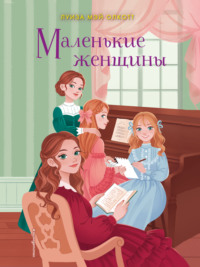 полная версия
полная версияLittle Women: or, Meg, Jo, Beth, and Amy
Laurie knew this pillow well, and had cause to regard it with deep aversion, having been unmercifully pummelled with it in former days, when romping was allowed, and now frequently debarred by it from taking the seat he most coveted, next to Jo in the sofa corner. If "the sausage" as they called it, stood on end, it was a sign that he might approach and repose; but if it lay flat across the sofa, woe to the man, woman, or child who dared disturb it! That evening Jo forgot to barricade her corner, and had not been in her seat five minutes, before a massive form appeared beside her, and, with both arms spread over the sofa-back, both long legs stretched out before him, Laurie exclaimed, with a sigh of satisfaction, —
"Now, this is filling at the price."
"No slang," snapped Jo, slamming down the pillow. But it was too late, there was no room for it; and, coasting on to the floor, it disappeared in a most mysterious manner.
"Come, Jo, don't be thorny. After studying himself to a skeleton all the week, a fellow deserves petting, and ought to get it."
"Beth will pet you; I'm busy."
"No, she's not to be bothered with me; but you like that sort of thing, unless you've suddenly lost your taste for it. Have you? Do you hate your boy, and want to fire pillows at him?"
Anything more wheedlesome than that touching appeal was seldom heard, but Jo quenched "her boy" by turning on him with the stern query, —
"How many bouquets have you sent Miss Randal this week?"
"Not one, upon my word. She's engaged. Now then."
"I'm glad of it; that's one of your foolish extravagances, – sending flowers and things to girls for whom you don't care two pins," continued Jo reprovingly.
"Sensible girls, for whom I do care whole papers of pins, won't let me send them 'flowers and things,' so what can I do? My feelings must have a went."
"Mother doesn't approve of flirting, even in fun; and you do flirt desperately, Teddy."
"I'd give anything if I could answer, 'So do you.' As I can't, I'll merely say that I don't see any harm in that pleasant little game, if all parties understand that it's only play."
"Well, it does look pleasant, but I can't learn how it's done. I've tried, because one feels awkward in company, not to do as everybody else is doing; but I don't seem to get on," said Jo, forgetting to play Mentor.
"Take lessons of Amy; she has a regular talent for it."
"Yes, she does it very prettily, and never seems to go too far. I suppose it's natural to some people to please without trying, and others to always say and do the wrong thing in the wrong place."
"I'm glad you can't flirt; it's really refreshing to see a sensible, straightforward girl, who can be jolly and kind without making a fool of herself. Between ourselves, Jo, some of the girls I know really do go on at such a rate I'm ashamed of them. They don't mean any harm, I'm sure; but if they knew how we fellows talked about them afterward, they'd mend their ways, I fancy."
"They do the same; and, as their tongues are the sharpest, you fellows get the worst of it, for you are as silly as they, every bit. If you behaved properly, they would; but, knowing you like their nonsense, they keep it up, and then you blame them."
"Much you know about it, ma'am," said Laurie, in a superior tone. "We don't like romps and flirts, though we may act as if we did sometimes. The pretty, modest girls are never talked about, except respectfully, among gentlemen. Bless your innocent soul! If you could be in my place for a month you'd see things that would astonish you a trifle. Upon my word, when I see one of those harum-scarum girls, I always want to say with our friend Cock Robin, —
"'Out upon you, fie upon you,Bold-faced jig!'"It was impossible to help laughing at the funny conflict between Laurie's chivalrous reluctance to speak ill of womankind, and his very natural dislike of the unfeminine folly of which fashionable society showed him many samples. Jo knew that "young Laurence" was regarded as a most eligible parti by worldly mammas, was much smiled upon by their daughters, and flattered enough by ladies of all ages to make a coxcomb of him; so she watched him rather jealously, fearing he would be spoilt, and rejoiced more than she confessed to find that he still believed in modest girls. Returning suddenly to her admonitory tone, she said, dropping her voice, "If you must have a 'went,' Teddy, go and devote yourself to one of the 'pretty, modest girls' whom you do respect, and not waste your time with the silly ones."
"You really advise it?" and Laurie looked at her with an odd mixture of anxiety and merriment in his face.
"Yes, I do; but you'd better wait till you are through college, on the whole, and be fitting yourself for the place meantime. You're not half good enough for – well, whoever the modest girl may be," and Jo looked a little queer likewise, for a name had almost escaped her.
"That I'm not!" acquiesced Laurie, with an expression of humility quite new to him, as he dropped his eyes, and absently wound Jo's apron-tassel round his finger.
"Mercy on us, this will never do," thought Jo; adding aloud, "Go and sing to me. I'm dying for some music, and always like yours."
"I'd rather stay here, thank you."
"Well, you can't; there isn't room. Go and make yourself useful, since you are too big to be ornamental. I thought you hated to be tied to a woman's apron-string?" retorted Jo, quoting certain rebellious words of his own.
"Ah, that depends on who wears the apron!" and Laurie gave an audacious tweak at the tassel.
"Are you going?" demanded Jo, diving for the pillow.
He fled at once, and the minute it was well "Up with the bonnets of bonnie Dundee," she slipped away, to return no more till the young gentleman had departed in high dudgeon.
Jo lay long awake that night, and was just dropping off when the sound of a stifled sob made her fly to Beth's bedside, with the anxious inquiry, "What is it, dear?"
"I thought you were asleep," sobbed Beth.
"Is it the old pain, my precious?"
"No; it's a new one; but I can bear it," and Beth tried to check her tears.
"Tell me all about it, and let me cure it as I often did the other."
"You can't; there is no cure." There Beth's voice gave way, and, clinging to her sister, she cried so despairingly that Jo was frightened.
"Where is it? Shall I call mother?"
Beth did not answer the first question; but in the dark one hand went involuntarily to her heart, as if the pain were there; with the other she held Jo fast, whispering eagerly, "No, no, don't call her, don't tell her. I shall be better soon. Lie down here and 'poor' my head. I'll be quiet, and go to sleep; indeed I will."
Jo obeyed; but as her hand went softly to and fro across Beth's hot forehead and wet eyelids, her heart was very full, and she longed to speak. But young as she was, Jo had learned that hearts, like flowers, cannot be rudely handled, but must open naturally; so, though she believed she knew the cause of Beth's new pain, she only said, in her tenderest tone, "Does anything trouble you, deary?"
"Yes, Jo," after a long pause.
"Wouldn't it comfort you to tell me what it is?"
"Not now, not yet."
"Then I won't ask; but remember, Bethy, that mother and Jo are always glad to hear and help you, if they can."
"I know it. I'll tell you by and by."
"Is the pain better now?"
"Oh, yes, much better; you are so comfortable, Jo!"
"Go to sleep, dear; I'll stay with you."
So cheek to cheek they fell asleep, and on the morrow Beth seemed quite herself again; for at eighteen, neither heads nor hearts ache long, and a loving word can medicine most ills.
But Jo had made up her mind, and, after pondering over a project for some days, she confided it to her mother.
"You asked me the other day what my wishes were. I'll tell you one of them, Marmee," she began, as they sat alone together. "I want to go away somewhere this winter for a change."
"Why, Jo?" and her mother looked up quickly, as if the words suggested a double meaning.
With her eyes on her work, Jo answered soberly, "I want something new; I feel restless, and anxious to be seeing, doing, and learning more than I am. I brood too much over my own small affairs, and need stirring up, so, as I can be spared this winter, I'd like to hop a little way, and try my wings."
"Where will you hop?"
"To New York. I had a bright idea yesterday, and this is it. You know Mrs. Kirke wrote to you for some respectable young person to teach her children and sew. It's rather hard to find just the thing, but I think I should suit if I tried."
"My dear, go out to service in that great boarding-house!" and Mrs. March looked surprised, but not displeased.
"It's not exactly going out to service; for Mrs. Kirke is your friend, – the kindest soul that ever lived, – and would make things pleasant for me, I know. Her family is separate from the rest, and no one knows me there. Don't care if they do; it's honest work, and I'm not ashamed of it."
"Nor I; but your writing?"
"All the better for the change. I shall see and hear new things, get new ideas, and, even if I haven't much time there, I shall bring home quantities of material for my rubbish."
"I have no doubt of it; but are these your only reasons for this sudden fancy?"
"No, mother."
"May I know the others?"
Jo looked up and Jo looked down, then said slowly, with sudden color in her cheeks, "It may be vain and wrong to say it, but – I'm afraid – Laurie is getting too fond of me."
"Then you don't care for him in the way it is evident he begins to care for you?" and Mrs. March looked anxious as she put the question.
"Mercy, no! I love the dear boy, as I always have, and am immensely proud of him; but as for anything more, it's out of the question."
"I'm glad of that, Jo."
"Why, please?"
"Because, dear, I don't think you suited to one another. As friends you are very happy, and your frequent quarrels soon blow over; but I fear you would both rebel if you were mated for life. You are too much alike and too fond of freedom, not to mention hot tempers and strong wills, to get on happily together, in a relation which needs infinite patience and forbearance, as well as love."
"That's just the feeling I had, though I couldn't express it. I'm glad you think he is only beginning to care for me. It would trouble me sadly to make him unhappy; for I couldn't fall in love with the dear old fellow merely out of gratitude, could I?"
"You are sure of his feeling for you?"
The color deepened in Jo's cheeks, as she answered, with the look of mingled pleasure, pride, and pain which young girls wear when speaking of first lovers, —
"I'm afraid it is so, mother; he hasn't said anything, but he looks a great deal. I think I had better go away before it comes to anything."
"I agree with you, and if it can be managed you shall go."
Jo looked relieved, and, after a pause, said, smiling, "How Mrs. Moffat would wonder at your want of management, if she knew; and how she will rejoice that Annie still may hope."
"Ah, Jo, mothers may differ in their management, but the hope is the same in all, – the desire to see their children happy. Meg is so, and I am content with her success. You I leave to enjoy your liberty till you tire of it; for only then will you find that there is something sweeter. Amy is my chief care now, but her good sense will help her. For Beth, I indulge no hopes except that she may be well. By the way, she seems brighter this last day or two. Have you spoken to her?"
"Yes; she owned she had a trouble, and promised to tell me by and by. I said no more, for I think I know it;" and Jo told her little story.
Mrs. March shook her head, and did not take so romantic a view of the case, but looked grave, and repeated her opinion that, for Laurie's sake, Jo should go away for a time.
"Let us say nothing about it to him till the plan is settled; then I'll run away before he can collect his wits and be tragical. Beth must think I'm going to please myself, as I am, for I can't talk about Laurie to her; but she can pet and comfort him after I'm gone, and so cure him of this romantic notion. He's been through so many little trials of the sort, he's used to it, and will soon get over his love-lornity."
Jo spoke hopefully, but could not rid herself of the foreboding fear that this "little trial" would be harder than the others, and that Laurie would not get over his "love-lornity" as easily as heretofore.
The plan was talked over in a family council, and agreed upon; for Mrs. Kirke gladly accepted Jo, and promised to make a pleasant home for her. The teaching would render her independent; and such leisure as she got might be made profitable by writing, while the new scenes and society would be both useful and agreeable. Jo liked the prospect and was eager to be gone, for the home-nest was growing too narrow for her restless nature and adventurous spirit. When all was settled, with fear and trembling she told Laurie; but to her surprise he took it very quietly. He had been graver than usual of late, but very pleasant; and, when jokingly accused of turning over a new leaf, he answered soberly, "So I am; and I mean this one shall stay turned."
Jo was very much relieved that one of his virtuous fits should come on just then, and made her preparations with a lightened heart, – for Beth seemed more cheerful, – and hoped she was doing the best for all.
"One thing I leave to your especial care," she said, the night before she left.
"You mean your papers?" asked Beth.
"No, my boy. Be very good to him, won't you?"
"Of course I will; but I can't fill your place, and he'll miss you sadly."
"It won't hurt him; so remember, I leave him in your charge, to plague, pet, and keep in order."
"I'll do my best, for your sake," promised Beth, wondering why Jo looked at her so queerly.
When Laurie said "Good-by," he whispered significantly, "It won't do a bit of good, Jo. My eye is on you; so mind what you do, or I'll come and bring you home."
XXXIII
JO'S JOURNAL
"New York, November."Dear Marmee and Beth, —
"I'm going to write you a regular volume, for I've got heaps to tell, though I'm not a fine young lady travelling on the continent. When I lost sight of father's dear old face, I felt a trifle blue, and might have shed a briny drop or two, if an Irish lady with four small children, all crying more or less, hadn't diverted my mind; for I amused myself by dropping gingerbread nuts over the seat every time they opened their mouths to roar.
"Soon the sun came out, and taking it as a good omen, I cleared up likewise, and enjoyed my journey with all my heart.
"Mrs. Kirke welcomed me so kindly I felt at home at once, even in that big house full of strangers. She gave me a funny little sky-parlor – all she had; but there is a stove in it, and a nice table in a sunny window, so I can sit here and write whenever I like. A fine view and a church-tower opposite atone for the many stairs, and I took a fancy to my den on the spot. The nursery, where I am to teach and sew, is a pleasant room next Mrs. Kirke's private parlor, and the two little girls are pretty children, – rather spoilt, I fancy, but they took to me after telling them 'The Seven Bad Pigs;' and I've no doubt I shall make a model governess.
"I am to have my meals with the children, if I prefer it to the great table, and for the present I do, for I am bashful, though no one will believe it.
"'Now, my dear, make yourself at home,' said Mrs. K. in her motherly way; 'I'm on the drive from morning to night, as you may suppose with such a family; but a great anxiety will be off my mind if I know the children are safe with you. My rooms are always open to you, and your own shall be as comfortable as I can make it. There are some pleasant people in the house if you feel sociable, and your evenings are always free. Come to me if anything goes wrong, and be as happy as you can. There's the tea-bell; I must run and change my cap;' and off she bustled, leaving me to settle myself in my new nest.
"As I went downstairs, soon after, I saw something I liked. The flights are very long in this tall house, and as I stood waiting at the head of the third one for a little servant girl to lumber up, I saw a gentleman come along behind her, take the heavy hod of coal out of her hand, carry it all the way up, put it down at a door near by, and walk away, saying, with a kind nod and a foreign accent, —
"'It goes better so. The little back is too young to haf such heaviness.'
"Wasn't it good of him? I like such things, for, as father says, trifles show character. When I mentioned it to Mrs. K., that evening, she laughed, and said, —
"'That must have been Professor Bhaer; he's always doing things of that sort.'
"Mrs. K. told me he was from Berlin; very learned and good, but poor as a church-mouse, and gives lessons to support himself and two little orphan nephews whom he is educating here, according to the wishes of his sister, who married an American. Not a very romantic story, but it interested me; and I was glad to hear that Mrs. K. lends him her parlor for some of his scholars. There is a glass door between it and the nursery, and I mean to peep at him, and then I'll tell you how he looks. He's almost forty, so it's no harm, Marmee.
"After tea and a go-to-bed romp with the little girls, I attacked the big work-basket, and had a quiet evening chatting with my new friend. I shall keep a journal-letter, and send it once a week; so good-night, and more to-morrow."
"Tuesday Eve."Had a lively time in my seminary, this morning, for the children acted like Sancho; and at one time I really thought I should shake them all round. Some good angel inspired me to try gymnastics, and I kept it up till they were glad to sit down and keep still. After luncheon, the girl took them out for a walk, and I went to my needlework, like little Mabel, 'with a willing mind.' I was thanking my stars that I'd learned to make nice button-holes, when the parlor-door opened and shut, and some one began to hum, —
'Kennst du das land,'like a big bumble-bee. It was dreadfully improper, I know, but I couldn't resist the temptation; and lifting one end of the curtain before the glass door, I peeped in. Professor Bhaer was there; and while he arranged his books, I took a good look at him. A regular German, – rather stout, with brown hair tumbled all over his head, a bushy beard, good nose, the kindest eyes I ever saw, and a splendid big voice that does one's ears good, after our sharp or slipshod American gabble. His clothes were rusty, his hands were large, and he hadn't a really handsome feature in his face, except his beautiful teeth; yet I liked him, for he had a fine head; his linen was very nice, and he looked like a gentleman, though two buttons were off his coat, and there was a patch on one shoe. He looked sober in spite of his humming, till he went to the window to turn the hyacinth bulbs toward the sun, and stroke the cat, who received him like an old friend. Then he smiled; and when a tap came at the door, called out in a loud, brisk tone, —
"'Herein!'
"I was just going to run, when I caught sight of a morsel of a child carrying a big book, and stopped to see what was going on.
"'Me wants my Bhaer,' said the mite, slamming down her book, and running to meet him.
"'Thou shalt haf thy Bhaer; come, then, and take a goot hug from him, my Tina,' said the Professor, catching her up, with a laugh, and holding her so high over his head that she had to stoop her little face to kiss him.
"'Now me mus tuddy my lessin,' went on the funny little thing; so he put her up at the table, opened the great dictionary she had brought, and gave her a paper and pencil, and she scribbled away, turning a leaf now and then, and passing her little fat finger down the page, as if finding a word, so soberly that I nearly betrayed myself by a laugh, while Mr. Bhaer stood stroking her pretty hair, with a fatherly look, that made me think she must be his own, though she looked more French than German.
"Another knock and the appearance of two young ladies sent me back to my work, and there I virtuously remained through all the noise and gabbling that went on next door. One of the girls kept laughing affectedly, and saying 'Now Professor,' in a coquettish tone, and the other pronounced her German with an accent that must have made it hard for him to keep sober.
"Both seemed to try his patience sorely; for more than once I heard him say emphatically, 'No, no, it is not so; you haf not attend to what I say;' and once there was a loud rap, as if he struck the table with his book, followed by the despairing exclamation, 'Prut! it all goes bad this day.'
"Poor man, I pitied him; and when the girls were gone, took just one more peep, to see if he survived it. He seemed to have thrown himself back in his chair, tired out, and sat there with his eyes shut till the clock struck two, when he jumped up, put his books in his pocket, as if ready for another lesson, and, taking little Tina, who had fallen asleep on the sofa, in his arms, he carried her quietly away. I fancy he has a hard life of it.
"Mrs. Kirke asked me if I wouldn't go down to the five o'clock dinner; and, feeling a little bit homesick, I thought I would, just to see what sort of people are under the same roof with me. So I made myself respectable, and tried to slip in behind Mrs. Kirke; but as she is short, and I'm tall, my efforts at concealment were rather a failure. She gave me a seat by her, and after my face cooled off, I plucked up courage, and looked about me. The long table was full, and every one intent on getting their dinner, – the gentlemen especially, who seemed to be eating on time, for they bolted in every sense of the word, vanishing as soon as they were done. There was the usual assortment of young men absorbed in themselves; young couples absorbed in each other; married ladies in their babies, and old gentlemen in politics. I don't think I shall care to have much to do with any of them, except one sweet-faced maiden lady, who looks as if she had something in her.
"Cast away at the very bottom of the table was the Professor, shouting answers to the questions of a very inquisitive, deaf old gentleman on one side, and talking philosophy with a Frenchman on the other. If Amy had been here, she'd have turned her back on him forever, because, sad to relate, he had a great appetite, and shovelled in his dinner in a manner which would have horrified 'her ladyship.' I didn't mind, for I like 'to see folks eat with a relish,' as Hannah says, and the poor man must have needed a deal of food after teaching idiots all day.
"As I went upstairs after dinner, two of the young men were settling their hats before the hall-mirror, and I heard one say low to the other, 'Who's the new party?'
"'Governess, or something of that sort.'
"'What the deuce is she at our table for?'
"'Friend of the old lady's.'
"'Handsome head, but no style.'
"'Not a bit of it. Give us a light and come on.'
"I felt angry at first, and then I didn't care, for a governess is as good as a clerk, and I've got sense, if I haven't style, which is more than some people have, judging from the remarks of the elegant beings who clattered away, smoking like bad chimneys. I hate ordinary people!"
"Thursday."Yesterday was a quiet day, spent in teaching, sewing, and writing in my little room, which is very cosey, with a light and fire. I picked up a few bits of news, and was introduced to the Professor. It seems that Tina is the child of the Frenchwoman who does the fine ironing in the laundry here. The little thing has lost her heart to Mr. Bhaer, and follows him about the house like a dog whenever he is at home, which delights him, as he is very fond of children, though a 'bacheldore.' Kitty and Minnie Kirke likewise regard him with affection, and tell all sorts of stories about the plays he invents, the presents he brings, and the splendid tales he tells. The young men quiz him, it seems, call him Old Fritz, Lager Beer, Ursa Major, and make all manner of jokes on his name. But he enjoys it like a boy, Mrs. K. says, and takes it so good-naturedly that they all like him, in spite of his foreign ways.









